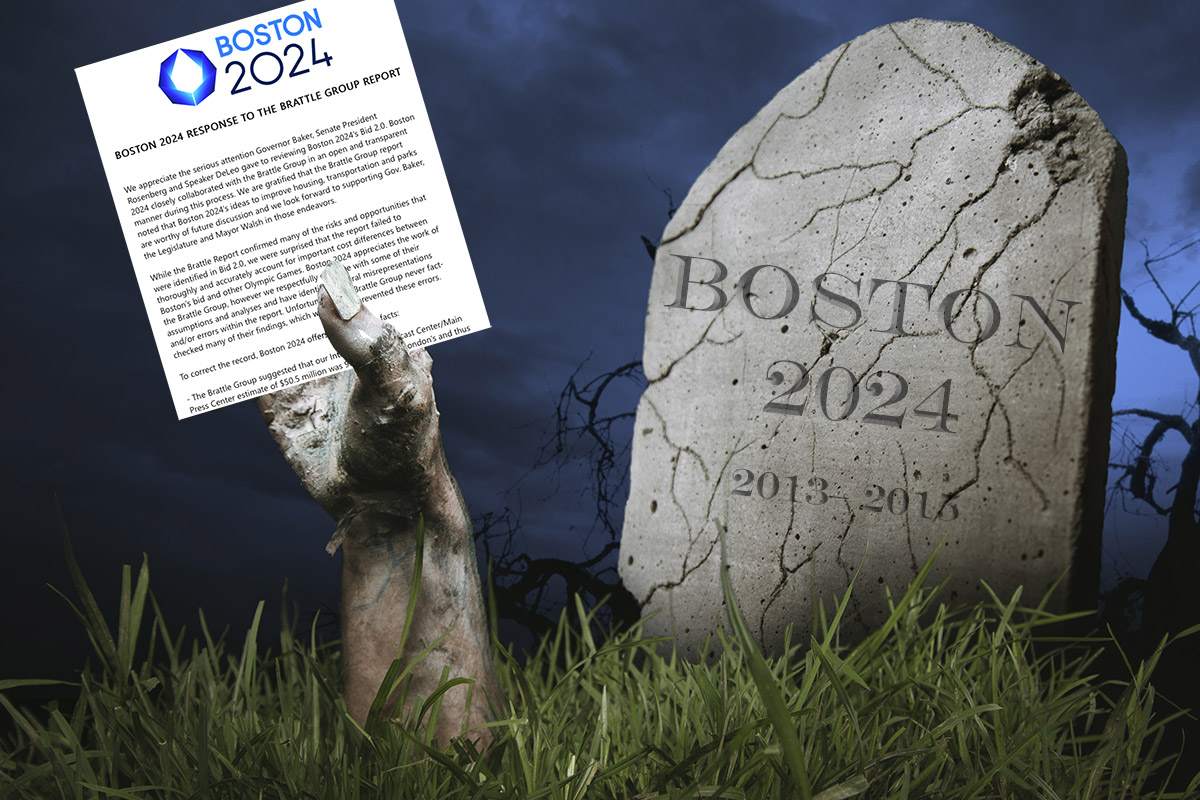Boston 2024 Returns from Dead to Throw Shade at Brattle Group Report

Zombie Image by Fer Gregory on Shutterstock/Illustration by Kyle Clauss
Beacon Hill leadership released Tuesday the long-awaited Brattle Group report, an economic analysis of Boston 2024’s Bid 2.0 and the potential risks it would have carried had it persisted through the summer and beyond. The nearly 200-page, up-to-$250,000 audit was scathing, alleging bid organizers had misestimated costs of its key venues by $970 million, while miscalculations on needed MBTA improvements bould have increased costs between $1.1 and 1.3 billion. This is especially embarrassing for the bid, as its CEO Rich Davey once headed the MBTA.
Though the United States Olympic Committee pulled the plug on the beleaguered bid on July 27, Boston 2024 released a 1,000-word rebuttal to the Brattle Group’s findings to reporters late Tuesday afternoon. (The USOC, meanwhile, did not respond to Boston magazine’s multiple requests for comment.)
“While the Brattle Report confirmed many of the risks and opportunities that were identified in Bid 2.0, we were surprised that the report failed to thoroughly and accurately account for important cost differences between Boston’s bid and other Olympic Games,” the rebuttal says. “Boston 2024 appreciates the work of the Brattle Group, however we respectfully disagree with some of their assumptions and analyses and have identified several misrepresentations and/or errors within the report.
“Unfortunately, the Brattle Group never fact-checked many of their findings, which would have prevented these errors.”
Boston 2024 called the analysis—commissioned by Gov. Charlie Baker, House Speaker Robert DeLeo, and Senate President Stan Rosenberg—a “simple comparison of our budget to past Games including London,” adding that it did, in fact, provide the Brattle Group with information regarding incremental costs associated with venues outside of Boston, which the latter says it never received.
“There was no effort to critique our venue by venue construction budgets which we provided, down to very specific costs of steel, concrete, plumbing, electrical and HVAC on a square foot basis,” the rebuttal says. These steel, concrete, plumbing, electrical and HVAC costs were not made available in the version of Bid 2.0 presented to the public.
Boston 2024 argues that Boston Mayor Marty Walsh would have been the only public official required to sign a taxpayer guarantee with the IOC, not a “combination of national, regional, and local government authorities,” as stated by the Brattle Group’s report. This is a curious hair to split, as one of the main selling points of Bid 2.0 was its statewide appeal, with proposed venues in New Bedford, Billerica, Quincy, and elsewhere beyond the city proper.
“Many of the concerns raised in the report mirror the same questions Mayor Walsh had throughout the bidding process,” Walsh’s spokeswoman Laura Oggeri said in a statement prior to the release of the rebuttal Tuesday. “Ultimately, without yet having confidence that the proposed financial plan would not result in any cost overruns, the Mayor was unable to commit to signing a financial guarantee that put taxpayers at risk.”
While the Brattle Group’s report calls the contingencies built into the bid’s construction budget were “considerably lower than those typically used in the construction industry for projects at such an early stage of development,” Boston 2024 claims “no detailed critique or analysis” was conducted on the budget at all.


